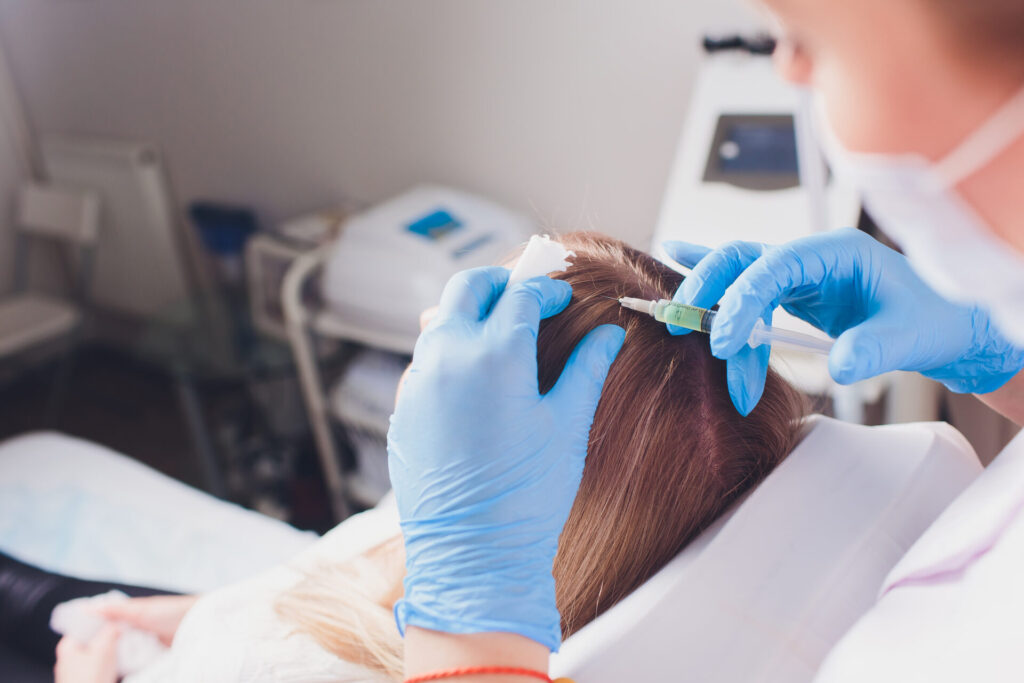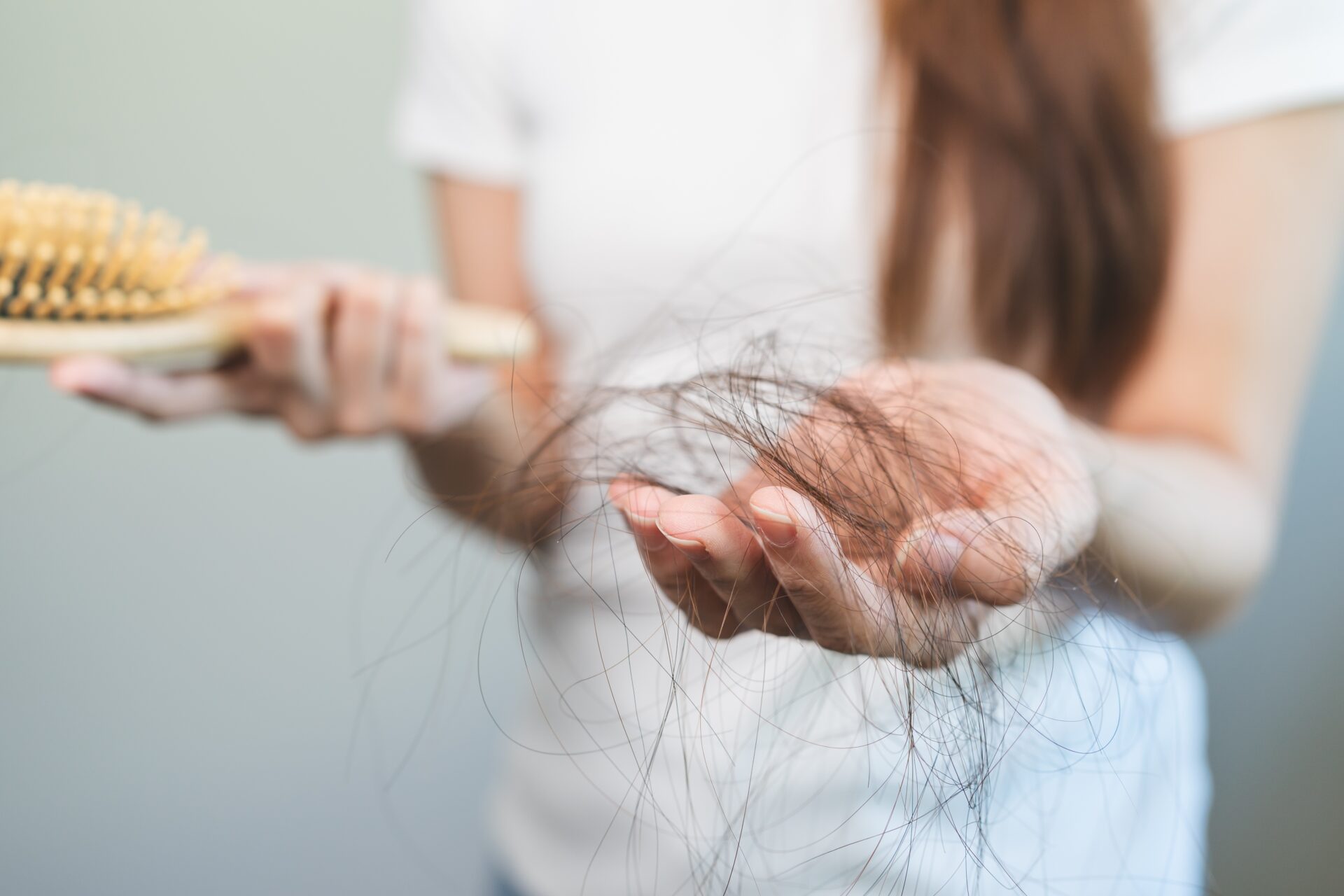There’s a moment of panic when you first notice it… strands of hair collecting on your clothes, clogging the shower drain, or scattering across the floor as you blow-dry. At first, you brush it off, hair sheds after all, it’s normal. But then it keeps happening. More hair in your brush, a thinner ponytail and you start to wonder: Is this just seasonal shedding, or is something more serious happening?
Hair loss isn’t just about vanity, it’s deeply personal. It can shake confidence, alter self-perception, and, in some cases, signal underlying health issues. While genetics play a role, lifestyle factors can make the issue even more pronounced.
‘Hair loss is a process, not a sudden event,’ Lars Skjøth founder of Danish hair loss clinic Hårklinikken, who has spent three decades researching scalp health, tells The Ethicalist. ‘The most common cause of hair thinning is androgenetic alopecia, or hereditary hair loss. For some, this is barely noticeable, even into their seventies. For others, it starts in their mid to late teens. But what many don’t realise is that external factors like lifestyle, stress, scalp health, diet, and other environmental factors can all accelerate this process.’
‘Someone who may have only started losing hair in their fifties or sixties might now see it happening in their thirties due to epigenetics – external stressors,’ he adds.

While shedding hair is more common than many realise – by the age of 35, approximately two-thirds of men experience noticeable hair thinning and around 40 per cent of women will have visible hair loss by the age of 40 – the reasons for consistently losing more than the 50 to 100 hairs a day that’s considered normal, is often more nuanced.
‘A high-pressure lifestyle can cause hormonal imbalances that contribute to increased shedding. In the UAE, the intense heat and constant air conditioning also take a toll on both the scalp and the hair’
Lars Skjøth, Founder Hårklinikken,
‘There are numerous factors contributing to hair loss, and it’s rarely a simple issue,’ explains Dr. Maurizio Viel, a globally recognised plastic surgeon, stem cell therapy specialist, and founder of Dubai’s Cornerstone Clinic. ‘In most cases, it can be attributed to a combination of age, genetics, hormones, stress, illness, and lifestyle. Stress in particular has become a significant trigger, alongside hormonal imbalances.’
Lars echoes this: ‘A high-pressure lifestyle can cause hormonal imbalances that contribute to increased shedding. In the UAE, the intense heat and constant air conditioning also take a toll on both the scalp and the hair. Air conditioning can cause dryness, while sun exposure damages the hair cuticle, making strands more brittle and prone to breakage.’

Nutritional quality is another often-overlooked factor. While the UAE’s organic, locally produced food sector is growing substantially, foods that travel long distances often lose a lot of their essential vitamins and minerals. ‘Not eating enough high-quality organic food, grown in mineral-rich soil can impact overall hair health,’ Lars notes.
‘Not eating enough high-quality organic food, grown in mineral-rich soil can impact overall hair health. Those on vegetarian or vegan diets, need to plan carefully to make sure there’s an adequate protein intake’
Lars Skjøth, Founder Hårklinikken,
Since hair is primarily composed of the protien keratin, a protien deficiency or a lack of key nutrients like iron, zinc, and vitamin D can contribute to thinning. ‘Those on vegetarian or vegan diets, need to plan carefully to make sure there’s an adequate protein intake,’ he adds. ‘However, if you’re mindful about including high-quality plant-based proteins and essential nutrients, it is absolutely possible to maintain strong, healthy hair.’
Early Detection
While many fixate on the hair they’re losing, the baby strands coming through also reveal what’s happening beneath the surface. ‘It’s not just about how much hair you’re shedding; it’s about the quality of the hair that’s growing back,’ says Lars. ‘Over time, the follicle shrinks, producing finer, more translucent hairs until it eventually stops growing hair altogether.’

Early detection is key to determine whether hair loss is temporary and treatable or part of a more complex, long-term condition that may require ongoing management rather than regrowth treatments. In the former cases, the issue is often reversible with the right intervention such as the treatments offered at Hårklinikken, that have helped 100,000 clients combat hair loss and thinning.
‘Some people may not be suitable candidates for our tailored treatment, particularly those with autoimmune-related hair loss,’ Lars explains. ‘For example, if someone comes in with bald patches the size of coins, widespread hair loss across the scalp, or even complete loss of eyebrows and body hair, that suggests an autoimmune condition.’
Because of this complexity, accurate diagnosis is essential. ‘When a client comes in, we examine their scalp under a magnifying lamp and microscope to assess their hair follicles,’ he says. ‘In some cases, we see that although they have experienced temporary shedding, the new hair growing back is strong and healthy, meaning their hair cycle is simply returning to normal, and they don’t need to worry. In other cases, someone may say they’ve been thinning for a year or two, but when we examine their scalp, we can see the process has actually been happening for 20 years.’

This individualised approach allows specialists to determine the best course of action. ‘From there, we develop a tailored treatment program, where every aspect, from formulations to adjustments and progress tracking, is refined continuously based on the client’s response.’
Just as Lars assesses each client’s needs, Dr. Maurizio follows a similar approach. Rather than offering a one-size-fits-all solution, he first evaluates whether a patient’s condition makes them a suitable candidate for non-invasive stem cell therapy, that extracts regenerative stem cells from your own fat tissue.
‘We refer patients not only to dermatologists and trichologists – hair specialists – but also to hormone and gut health specialists. Hair loss is complex, and treatments should be holistic, not just business-driven’
Dr. Maurizio Viel, Founder Cornerstone Clinic
‘We assess whether the patient still has viable hair follicles. If they do, stem cells can help regenerate growth,’ he says. ‘We extract regenerative stem cells from a patient’s own fat tissue and send them to a state-of-the-art laboratory for processing. This process takes about two to three weeks, after which the stem cells are reinjected into the scalp over multiple sessions to stimulate natural hair growth.’
Collaboration between specialists is essential, Dr. Maurizio stresses. ‘We refer patients not only to dermatologists and trichologists – hair specialists – but also to hormone and gut health specialists. Hair loss is complex, and treatments should be holistic, not just business-driven.’

One area gaining attention in the field of hair restoration is the gut-hair connection. Poor gut health can lead to inflammation, hormonal imbalances, and nutrient absorption issues, all of which can contribute to hair thinning.
Lars has spent the last ten years developing a hair supplement specifically designed to address these imbalances. ‘I didn’t want to create just another supplement packed with biotin and B vitamins,’ he says. ‘Our formula targets the root causes of hair thinning, supporting scalp health, stress reduction, and better nutrient absorption.’
Launched just under a year ago, Lars has been astounded with patient outcomes: ‘The results have been beyond what I expected. In our trials, we saw a healthy young woman in her mid-20s achieve in just 90 days what I would typically expect to take six months, or even longer. I was genuinely shocked by the speed and effectiveness of the transformation’
Hair loss is never just one thing. It’s a combination of genetics, environment and lifestyle factors. While there’s no instant solution, experts agree that targeted treatments and addressing underlying health concerns can dramatically improve outcomes for the right candidates.
‘Be skeptical of quick fixes,’ Lars advises. ‘Hair loss is deeply personal, and effective treatment needs to be tailored to the individual.’
For those noticing more strands on their brush or in the shower, the best approach is early intervention, professional consultation, and a commitment to long-term hair health.
For more information or to book an appointment visit Hårklinikken.ae or Cornerstoneclinics.ae










